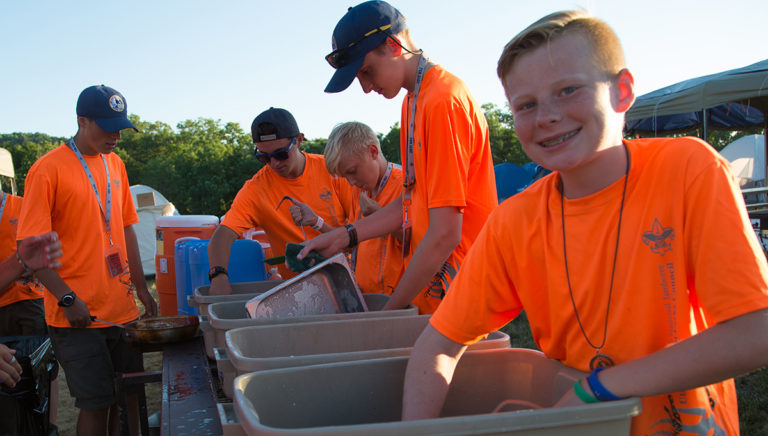How to make kitchen patrol, or KP, a little less onerous

It’s practically every Scout’s least favorite task on the duty roster, but cleaning dishes does not have to turn into a necessary evil.
It can turn that way if kitchen police/patrol, aka “KP duty,” is used as a punishment or as the spoils of a competition (e.g. “The winning patrol gets to choose which patrol does KP for them.”) Negativity can also set in if one Scout is left alone to clean a mountain of dirty dishes.
Mealtime should be an opportunity to build responsibility, hone cooking skills and promote teamwork. A gentle reminder to the senior patrol leader can help Scouts remember to keep these goals in mind.
A Scout is clean
Duty rosters serve as great tools for patrol leaders to divvy up meal tasks and assign responsibility — cooking, building the campfire, gathering water, cleanup — but these roles do not have to remain rigid. Meals that turn messy call for everyone to lend a hand, especially when Scouts are looking forward to another activity soon after eating.
As the Cooking merit badge pamphlet recommends, “If everyone cleans one pot, pan, or utensil, the work will be done in no time.”
Many patrols designate a couple of Scouts to assist in cleanup, a role that can rotate to other Scouts from meal to meal.
Cleaning can be a chore done during cooking. Putting up packages and unused utensils as well as throwing away waste as the food is being cooked cuts down on time tidying up after the meal. Placing a pot of water on the stove ensures hot water is ready for rinsing dishes by the time people are done eating.
When implementing the three-pot method for cleaning, assigning a Scout at each station can not only make the work go by faster, but it also builds camaraderie.
Dealing with a ‘kitchen nightmare’
Not every Scout is the next Alton Brown (who, by the way, was a Boy Scout), so those on KP duty could be left with a heap of greasy pans and pots blackened with what was supposed to be food. Here are a couple of tips for cleaning up the mess:
For burned pots and pans that prove next to impossible to scrape the “black” encrusted on the bottom, place the cookware back on the burner. Pour in a cup of water and a cup of vinegar, and bring it to a boil. Remove the pan and toss in two tablespoons of baking soda. Empty the liquid and scour the pan. This should help bring the pan’s interior back to its former shiny glory.
To clean a greasy cast iron skillet, you can use soap and water (just don’t soak the pan, and make sure it’s dry afterward to avoid rusting) or sprinkle kosher salt and use a paper towel to wipe it clean. The salt acts as an abrasive, helping remove food and grease from sticking to the pan.
Always remember “Leave No Trace” principles when cleaning dishes: dispose of soapy dishwater at least 200 feet from any water source, camps or trails. Use biodegradable camp soap. Strain food bits out of dishwater and trash them. Grease and oily water should be packed out.
